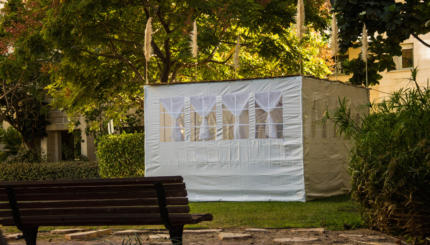Sukkot, which begins Sunday, is called by our sages, “The season of our rejoicing.” But why should we rejoice?
Just this week, we beat our chests, repented of our wrongs and begged for forgiveness. We reviewed the sins in which we wallowed for the last year, and promised to try to do better. On Yom Kippur, we read Isaiah and were reminded that although we “seek God daily,” what we are really doing is a pretense. God is not fooled when we ask, “Why, when we fasted, did You not see? When we starved our bodies, did You pay no heed?” and answers, “Because on your fast day you see to your business and oppress all your laborers!” when what God wants of us is “to share your bread with the hungry, and to take the wretched poor into your home; When you see the naked, to clothe him.”
On Yom Kippur, we fast, and perhaps some few of us leave the fast and go to do these things — but how many of us?
Rabbi Shemuel Ben Meir, a French rabbi of the 12th century known as the Rashbam, explains:
Why do I command you to [live in a sukkah]? Do not say in your hearts, “My own power and the might of my own hand have won this wealth for me. Remember that it is the Lord your God who gives you the power to get wealth” (Deut. 8:17-18). Therefore, the people leave houses filled with good at the harvest season and they dwell in sukkot as a reminder that they had no property in the desert or homes to inhabit. This is why God designated Sukkot at the harvest season, so that a person’s heart should not grow haughty because of houses filled with everything good, lest they say: “Our hands made all of this wealth for us.”
He is actually summarizing. The passage reminds us that in the good land, where there is abundance of everything, we are in danger of forgetting who we are: “when thou hast eaten and art satisfied, and hast built goodly houses, and dwelt therein; when thy herds and thy flocks multiply, and thy silver and thy gold is multiplied, and all that thou hast is multiplied; then thy heart be lifted up, and thou forget the LORD thy God…and thou say in thy heart: ‘My power and the might of my hand hath gotten me this wealth.” (Deut. 8:11-17)
It is precisely the clean clothes, the wealth in our hands, the choice to eat or to fast — they give us the illusion that what we have is what we deserve, rather than that it is ours by grace. On Yom Kippur, even as we repent, we may be thinking about work, or about what we’re going to eat later.
Contrast this with Sukkot — on Sukkot we live in our father Abraham’s tent, that tent open on all sides to welcome those who need food and shelter. On Sukkot, we are earthy, earthly, creatures who get wet in the rain and dirty sleeping on the ground. We are reminded that we have nothing, really, and must rely on the kindness and grace that comes to us. We live the truth. And this should bring us joy. It is the moment in which we can remember that we are no different than any homeless person we see on the street. Perhaps we are just luckier.
And when we invite the ushpizin — the sacred guests — into our sukkah, perhaps that will prompt us, once the week is over, that repentance is not enough without returning to the real, imperfect, smelly world and doing something with the grace offered to us.
Rabbi Samson Raphael Hirsch writes, “The sukkah will remove the bonds and suffering of Sheol from humanity, whose conduct supported it. Despite the mistaken and misleading concept of respecting material goods and property as if they were deities, humanity will renounce them, turn heavenward, and then God will bring it under its sukkah of peace, which will then be spread over all the peoples of the earth, and the one, unique God will then be for all humanity and his name will be One.”
sukkah
Pronounced: SOO-kah (oo as in book) or sue-KAH, Origin: Hebrew, the temporary hut built during the Harvest holiday of Sukkot.
Sukkot
Pronounced: sue-KOTE, or SOOH-kuss (oo as in book), Origin: Hebrew, a harvest festival in which Jews eat inside temporary huts, falls in the Jewish month of Tishrei, which usually coincides with September or October.


